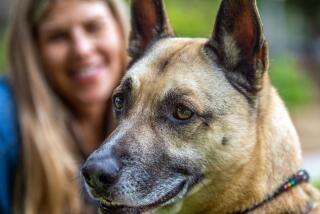A Dog May Be a Disabled Person’s Best Friend
- Share via
CHICAGO — Forced into a wheelchair by multiple sclerosis, Lane Phalen struggled for four years with doors, picking up things that fell or shopping.
But Phalen has become one of thousands of disabled Americans getting a physical and emotional lift from dogs trained to do some of the things their masters can’t. A new study says the dogs can also provide a measure of independence from costly and sometimes humiliating assistance.
Phalen’s golden retriever, trained by a Michigan-based organization, can pull her wheelchair, open and close doors with straps attached, and bring her a phone. Now she believes Beau will motivate her to leave the wheelchair permanently.
“As a disabled person, I was accustomed to everybody taking care of me and the focus of activity being on me,” said Phalen, 40, a writer in Hoffman Estates, Ill. “It’s very easy to slide into, ‘OK, just take care of me.’ But since I am totally responsible for his welfare, I feel needed again.”
A two-year study published in Wednesday’s Journal of the American Medical Assn. found that service dogs improved the psychological, social and economic well-being of 48 disabled people who had asked for canine assistance.
The dogs brought “increased levels of social interaction, employment and use of public transportation” to people who cannot walk because of MS, muscular dystrophy, or brain or spinal cord injury, the researchers wrote.
The study, by Jim Blascovich of UC Santa Barbara and Karen Allen of the State University of New York at Buffalo, found that disabled people who had a service dog for a year spent 68% less on hired assistants than they did before getting the dog.
Blascovich and Allen said the presence of a service dog could save a disabled person more than $16,000 a year.
The disabled people in the study also needed far less help from family and friends once they began using service dogs, which are available for free from organizations funded by donations.
Michael Sapp, chief operating officer of Paws With a Cause, the Byron Center, Mich., organization that trained Beau, said he hoped the study would encourage insurance companies to pay for service dogs.
More to Read
Sign up for Essential California
The most important California stories and recommendations in your inbox every morning.
You may occasionally receive promotional content from the Los Angeles Times.










